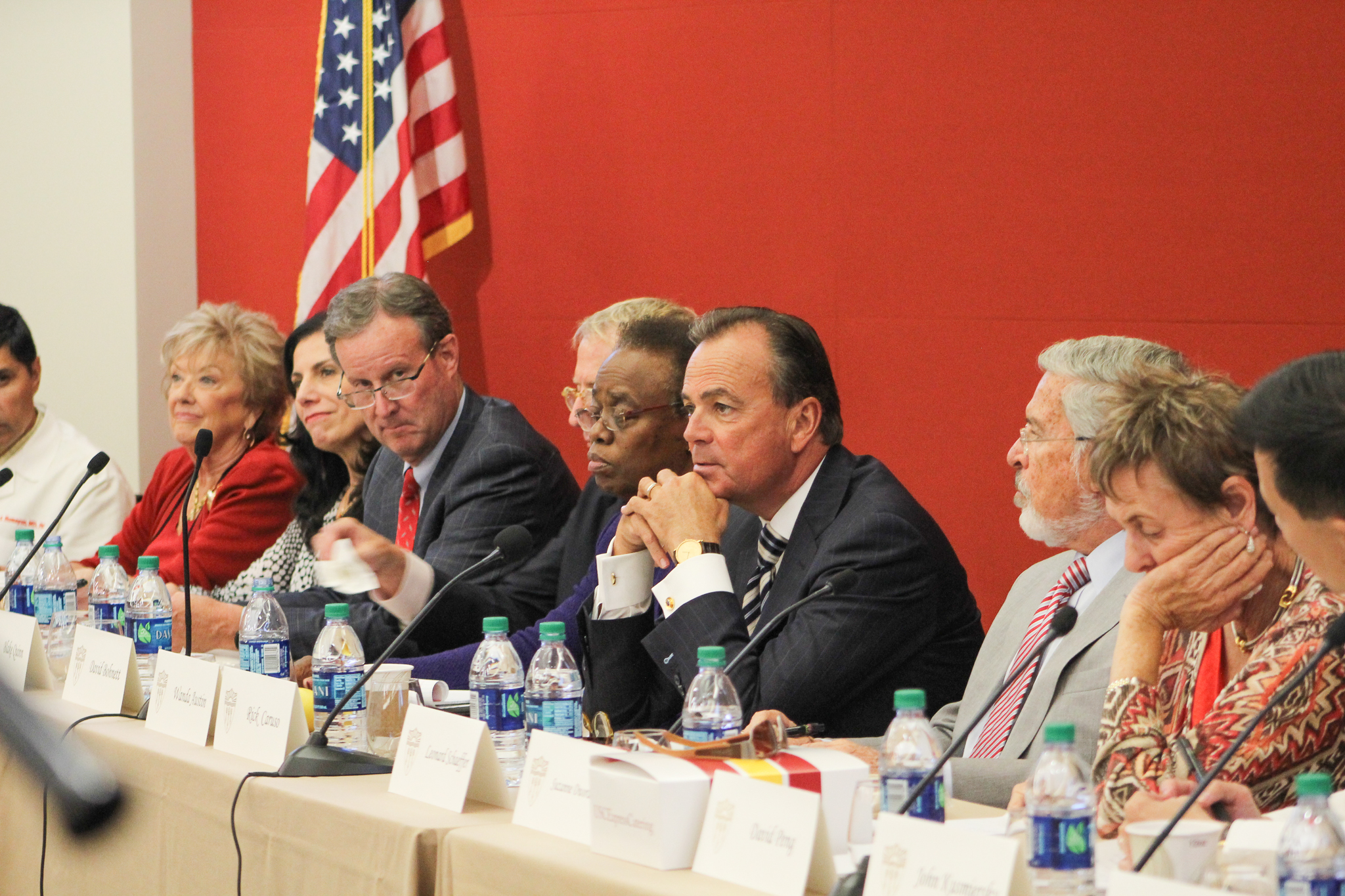Attendees addressed inclusivity at presidential forum

Members of the presidential search committee listened to comments from students, staff, faculty and alumni who expressed needs for pay equity and racial diversity on campus. (Gabriela Thur De Koos | Daily Trojan)
The Board of Trustees held its second presidential search forum in Aresty Conference Center on the Health Sciences Campus Monday. USC community members spoke about issues at the University to 12 members of the 23-person search committee, most of which are Board members.
To start off the session, Chairman Rick Caruso explained the process of finding a new president for the University. These three sessions over the past week only constitute the first of five phases, he said.
Caruso then made a public apology to the Daily Trojan and Annenberg Media for what he called a mistake on University Communications’ part during the Sept. 13 session. While the forum was taking place, reporters from student media outlets were not permitted to take notes and were told they could only ask follow-up questions after the event.
Following Caruso’s introduction and apology, the Board gave the floor to the staff, students and alumni present. Speakers voiced needs that ranged from pay equity among workers on the Health Sciences Campus to an increase in racial diversity by offering more financial aid to undergraduate students.
Grant Amann, a sophomore majoring in urban studies and planning, was the only undergraduate student to speak at the forum and emphasized the importance of teaching. According to Amann, the USC Center for Excellence in Teaching can potentially help inspire a stronger community among students and professors.
“I’ve heard a lot of discouraging things from my peers, and I’ve seen personally a lot of things from professors that are just not the best teaching habits,” Amann said. “I truly believe that a university can only be as good as its teachers, and I know we have things in place, but I don’t think they are getting the attention that they need.”
Kristina Williams, a graduate student at the Iovine and Young Academy, said that the future president needs to hold more accountability on diversity and inclusion on campus. Williams said that as a person of color she was disappointed that the Academy’s orientation video featured four white men and one racially ambiguous man. For Williams, the Academy is centered on disruption and innovation, but that the campus does not reflect such inclusivity.
In response to this discrepancy, Williams is conducting a research capstone project that will identify gaps in opportunities across campus and redesign the program’s curriculum to set a better standard for diversity and inclusion.

Kathy Ward, director of advancement for USC Viterbi School of Engineering, addressed the presidential search committee. (Gabriela Thur De Koos | Daily Trojan)
“For the next president, I hope for there to be someone who holds accountability and standards for these issues, for there to be a culture that isn’t giving weight for me to have to do this research in a program that I’m paying to be in,” Williams said.
The conversation then expanded to faculty and alumni. James Gordon, associate dean of biokinesiology and physical therapy, offered a different perspective on the presidential search. To Gordon, the University is investing too much hope into the future president when the problems with USC lie elsewhere: the University’s culture.
“We have evolved a culture that has moved us into what I can only term as corruption,” Gordon said. “I think the mission of the University has become to raise money … I know the deans and the provosts are judged not by the excellence of their educational or research programs, but how much money they raise. And that culture that puts money before everything else, I don’t think a new president is going to change that unless we change that mission.”
Alumna Kerry Franco, the Office of Foundation Relations’ senior director of development, voiced similar concerns, noting that the University is more of a “reactive” environment rather than a proactive one when it comes to issues.
“We try to solve problems by the lens of how it’s going to make us look,” Franco said. “We are so concerned about our image.”
The listening sessions will conclude on Sept. 25 in Town and Gown. According to Caruso, the next phase in the presidential search process will involve “lots of networking and searching” for potential candidates.
The search will remain confidential due to the “sensitivity” of finding the right candidate. Two higher education recruitment firms — Isaacson Miller and Heidrick & Struggles — will aid in the search and advise the Board to guarantee “the broadest landscape” of potential leaders to serve USC, Caruso said.
